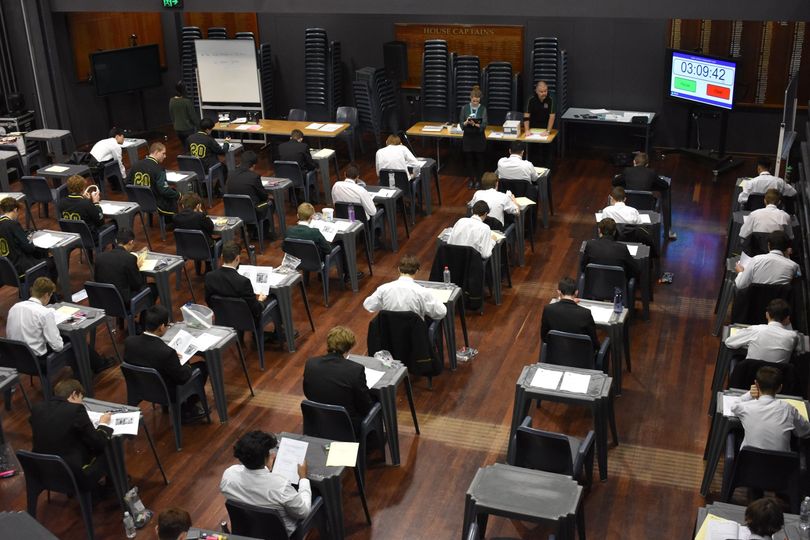As we all know, there are times in our lives where we will encounter challenges that can cause stress and anxiety. For many students, these challenges often begin to show in the lead-up to exam time and continue intensifying as the exams go on.
Increased workloads, deadlines, exam prep and the exams themselves can be overwhelming to students. Causing myriad reactions depending on the child’s stress response. While we all respond to stress in different ways, a loss of perspective can amplify a student’s stress response. This can lead to unhelpful negative thoughts and views of what the future holds.
As we inch closer to the end of the school year, older students in Years 10, 11 and 12 are preparing to enter exams and experiencing their stressful times.
For year 12s, these exams signify the end of their secondary schooling, with their success (or failure) often linked to their future academic endeavours. It’s quite common to hear these students verbalise these stresses by saying things like: “I need to achieve an A to get the ATAR I need to get into the course I want.”
While it is admirable for students to have goals (such as getting an ‘A’ or a certain ATAR score), statements like these can be a red flag for parents to be aware of. It is possible the student is narrowing their perspective, which can lead to a student who has lost insight into the process required to achieve their goals
The question for most parents during this time is how can they help their child during this difficult time? Below are a few recommended tips from Wesley College to help your child reduce stress and maintain their perspective.

5 Tips to Help Students Reduce Study Stress:
1) Get them to Focus on the Big Picture
Every parent and teacher wants to see their student succeed academically. We want them to strive to achieve their academic best, but an academic ‘hiccup’ at this stage is not the end of the world. Whether the problem is low grades or low ATAR scores, nothing at this stage seals their fate for completing studies or reaching their personal career goals.
Data from the Tertiary Institutions Service Centre (TISC) shows that in 2019 79.1% of TISC applicants received a university offer in the main round; that was almost 16,000 students who received a main round offer! In addition to this, the students who did not receive an offer in the main round still had the opportunity to receive an offer in the second round.
Clearly, it’s important to keep encouraging your student to still work hard, but it’s also important that you both acknowledge that an academic ‘hiccup’ is not the end of the world. Knowing this can help put your child’s mind at ease.
2) Use Positive Language
As soon as you hear your child talking in terms of: ‘I need to get an A to get the ATAR score I need’ take a moment to acknowledge that they may be creating unnecessary pressure and stress for themselves.
Naturally, you want to foster their desire to perform at their best. However, there is also a tipping point where performance and outcome pressure begins to cause overthinking– reducing our ability to perform. This kind of negative thinking and pressure it created often leads to students becoming unfocussed and overwhelmed. Diverting their attention from their study goals.
A simple solution to this conundrum is to help them tweak their language. When you hear any of the ‘I have to’ or ‘I need to’ language being used, pause the conversation and invite them to adjust their language. Changing their words to statements like: ‘My goal is to get an A’ or ‘I would like to get X score for the ATAR’ should relax expectations and create a more positive mindset.
3) Manage Their Expectations
Unrealistic expectations cause considerable stress. These expectations are not just ones students set for themselves but from their family and their peers. Make sure that you are aligning expectations that are set with realistic, attainable goals throughout their journey. Creating milestones along their path to exams or large assignments will guide them and remove unnecessary stresses.
An example goal for your child could be something like: ‘My goal is an 80% score for English’. If your child has averaged 75% across the semester, this is likely a realistic and attainable goal. Then you can get to work on setting up a structure for how you will plan and achieve this goal. However, if a student has averaged 55% across the semester, it may be best to set a more realistic goal and work towards that.
Remember: Not achieving a goal that was set for a subject does not put added pressure to surpass a goal for another subject. Attempting to ‘square the ledger’ or ‘make up for’ shifts focus away from what is most important – working to achieve the original goal set. Wait until they complete their exams before you evaluate… and then start setting goals for next time!

4) Make Sure They are Making Time for Themselves
Many students will often get lost in their studies and forget that it’s important to take a break. Taking time to focus on an activity outside of school can help in maintaining their study focus and reduce stress.
Make sure to have your child take plenty of breaks while they are studying (the Pomodoro method is a great way to break up studying). Also, make sure that they are getting to have a bit of fun and engaging in school activities & spending time with their friends on the weekends! You want to ensure that they get a chance to enjoy the last of their secondary school years!
5) Help Them Get Organised and Take Action
If you have helped your child adjust perspective, helped with setting goals and study boundaries then the final thing you can do is help them organise and take action. Things you can do include:
- Work together to set up a study space at home
- Create a study timetable that allocates specific times for study
- Enlist the help of a tutor if needed
- Make sure to give them plenty of encouragement as they hit their goals along the journey.
By following the above advice, you’ll be helping reduce your child’s stress levels. You’ll also be providing them with tools to manage their anxiety around study and exams.
However, for some students, their stress and anxieties may be larger than study and tests. If you think that your child is suffering from a more serious form of anxiety, you may want to consider checking in with your doctor or counselor. At Wesley College, we have psychologists on staff that work with students looking for help and tools surrounding their mental health. For more information about our pastoral care click here.
*This blog has been updated from a previous version.
Subscribe to Wesley College News & Events